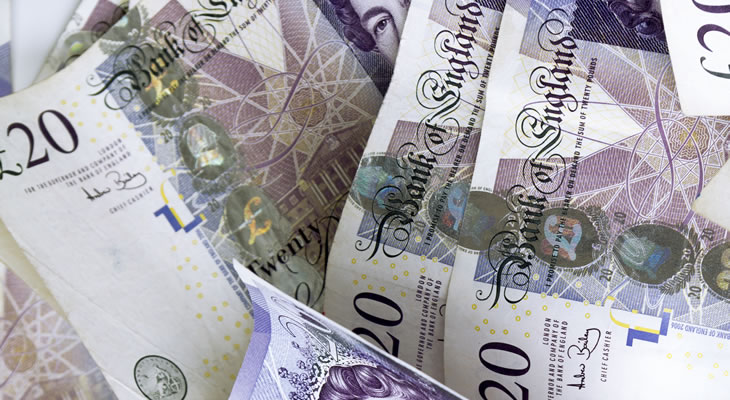Pound to Euro Exchange Rate Advances Following UK Jobs Report
Following over a week of being undermined by ‘no deal’ Brexit fears, the Pound Sterling to Euro (GBP/EUR) exchange rate finally saw some stronger support on Tuesday in the form of Britain’s latest job market report.
Due to a perceived currency crisis in Turkey impacting the Euro (EUR), GBP/EUR quickly recovered from last week’s 2018 low of 1.1083 to close last week at the level of 1.1188.
However, while GBP/EUR continues to climb and trended in the region of 1.1215 at the time of writing on Tuesday, it remained below last week’s opening levels of 1.1238.
The Pound (GBP) finally saw some domestic support on Tuesday, as Britain’s key unemployment rate improved more than expected. Meanwhile, mixed Eurozone growth and inflation figures weighed on the Euro (EUR).
Could GBP/EUR keep climbing though? Investors are now highly anticipating Britain’s July inflation results and retail sales stats, due for publication in the coming days.
Pound (GBP) Exchange Rates Climb as UK Unemployment Rate Sees Surprising Improvement
Despite market expectations that Britain’s unemployment rate would remain at 4.2% in June, the rate unexpectedly improved to 4.0%, in news that helped the recently unappealing Pound to perform more strongly on Tuesday.
This was despite the day’s other job stats causing some concerns. The number of new jobs made was actually smaller than expected, and wages were slightly lower than forecast too.
Analysts had expected Britain’s average earnings including bonus to remain at 2.5%, but the figure unexpectedly slipped to 2.4%.
According to Ruth Gregory, Senior UK Economist at Capital Economics, the data:
‘showed that real wage growth remains subdued, casting doubt over the likely strength of any recovery in consumer spending growth’
Ultimately though, the wages were consistent with the generally expected wage trend for the latter half of 2018. This left investors generally a bit more optimistic about domestic consumer spending growth and the Pound edged higher.
Eurozone Growth Beats Forecasts, but Euro (EUR) Exchange Rate Strength Limited
The Pound may have seen a stronger advance against the Euro on Tuesday, but the day’s anticipated Eurozone Gross Domestic Product (GDP) growth projections came in above forecasts in their most influential prints.
Q2 Eurozone growth projections were forecast to have slowed slightly from 0.4% to 0.3% quarter-on-quarter, and from 2.5% to 2.1% year-on-year. However, the results instead came in at 0.4% and 2.2% respectively.
With Eurozone growth stronger than expected, it bolstered market hopes for the general strength of the Eurozone’s economy in Q2 despite months of uncertainties about US trade protectionism.
Demand for the Euro was given further support in the form of ZEW’s August economic sentiment surveys, which beat forecasts in every notable print.
While Germany and the Eurozone’s economic sentiment indexes were still in the negatives, they came in at -13.7 and -11.1 respectively – much lighter than the forecast -20.7 and -16.4.
Still, the Euro’s strength was limited slightly by Germany’s mixed growth data and the Eurozone’s underwhelming June industrial production figures, both also published on Tuesday.
Pound to Euro (GBP/EUR) Forecast: UK Price Pressures in Focus
The Pound to Euro (GBP/EUR) exchange rate edged higher on Tuesday in response to Britain’s surprising improvement in unemployment, but concerns about UK price pressures did rise slightly amid the slip in wages.
As a result, Pound investors will be anticipating the publication of Britain’s July Consumer Price Index (CPI) inflation rates on Wednesday, which will give investors a better idea of how UK price pressures are performing.
UK inflation is forecast to have contracted slightly, to -0.1%, month-on-month. The yearly figure is expected to have risen though, from 2.4% to 2.5%.
If the monthly figure contracts more than expected or the yearly figure doesn’t show any improvement, investors may become more concerned that UK price pressures are still too subdued.
This could make investors concerned that the Bank of England (BoE) was hasty in hiking UK interest rates in August, which would make the Pound unappealing.
Britain’s Thursday retail sales report could inspire some Pound movement on Thursday, when the Eurozone’s latest trade balance data will be published too. The Eurozone’s final July inflation data will come in on Friday.
Of course, markets remain anxious about the possibility of a ‘no deal’ Brexit and any developments in Brexit news could have a notable impact on the Pound to Euro (GBP/EUR) exchange rate outlook.


Comments are closed.